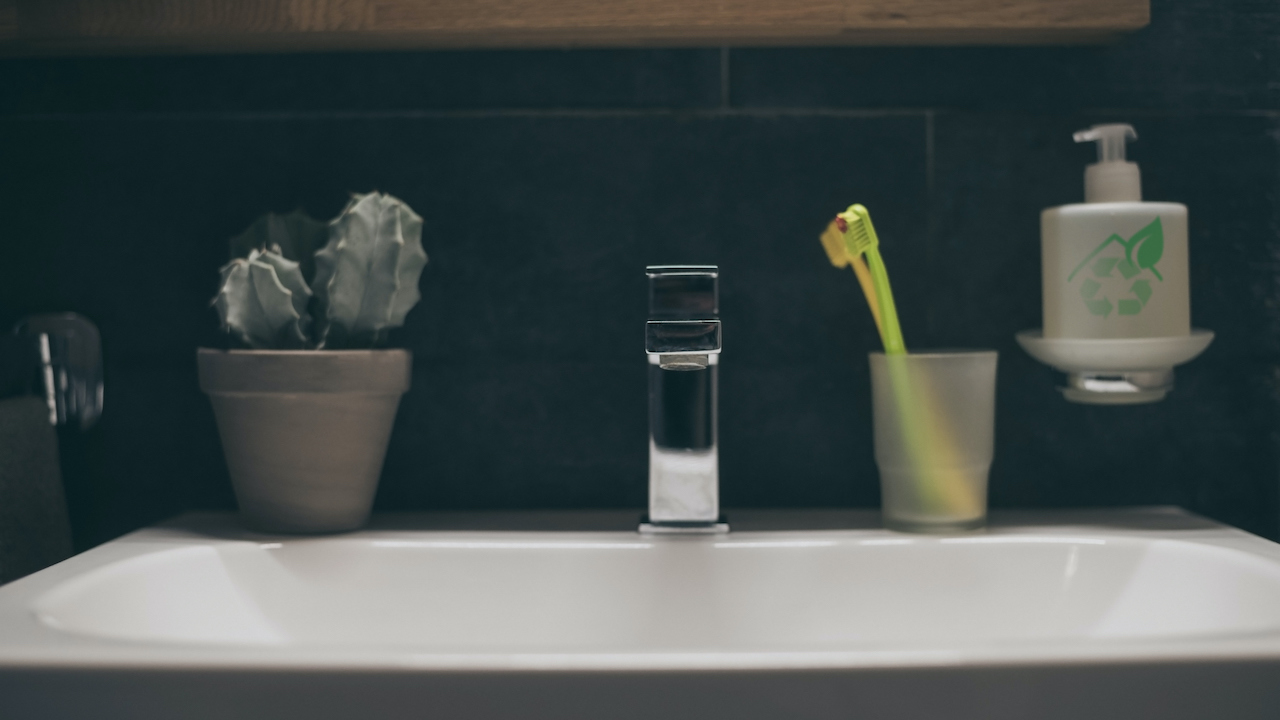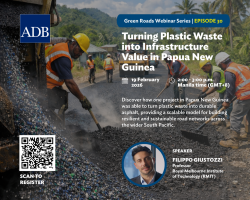
Big hotels are shifting toward a circular economy of plastics, which entails reusing and recycling products and materials so no waste goes to landfills. Photo credit: iStock/Fabio Principe.
By switching to reusable bottles and refillable soap dispensers and greening supply chains, hotels chains make a headway in reducing plastic wastes.
Check in to a Club Med in Bali, Raffles in Makati, Peninsula in Bangkok, City of Dreams in Manila, or a Six Senses resort in Ninh Van Bay in Viet Nam and chances are either the toothbrush kits, the mini shampoo and conditioner bottles, or the single-use plastic cups that usually come free with the room will no longer be as readily available.
Or if they are still in the room, they will soon be phased out.
Goodbye, plastic.
These global hotel chains are among tourism businesses that have pledged to reduce the use of single-use plastic in all their properties under the Global Tourism Plastics Initiative (GTPI) led by the United Nations Environment Programme (UNEP) and the World Tourism Organization in collaboration with the Ellen MacArthur Foundation.
The initiative marshals the tourism sector to address the root causes of plastic pollution. As signatories, businesses, governments and other tourism stakeholders commit to lead by example in shifting toward a circular economy of plastics, which entails reusing and recycling products and materials so no waste goes to landfills.
In December, GTPI came out with its first report on signatories’ initiatives to reduce plastic.
The International Union for Conservation of Nature says at least 14 million tonnes of plastic end up in the ocean every year. Another research says annual plastic water pollution could reach 53 million tonnes by 2030.
108 million and counting
According to the plastics initiative report, hotel and resort operators Accor, Club Med, Hongkong and Shanghai Hotels, Melco Resorts & Entertainment Limited, and Six Senses, all with presence in Southeast Asia, have made a headway in cutting plastics from their properties despite the challenges posed by the coronavirus disease (COVID-19) pandemic, which stalled global tourism. The report also includes initiatives from Iberostar, a hotel chain with locations in the Unites States, Africa, and Europe, and plastic packaging company deSter.
In 2020 alone, over 108 million plastic items and packaging, weighing a total of 804 metric tonnes, equivalent to 27 large shipping containers, were eliminated by the companies. The hotel chains would have been able to phase out more items if not for the pandemic.
Many of the plastic items eliminated were in food and beverage services, bathrooms, service areas, and rooms. Eliminating plastic items and packaging in kitchens and cleaning services needs to be further addressed, the report said.
Accor
Accor accounts for more than half of the plastics items and packaging eliminated by the reporting companies. It operates 55 hotel brands in over 5,100 locations worldwide, with some in Southeast Asia, including Raffles, Fairmont, Sofitel, Banyan Tree, Movenpick, Orient Express, Angsana, Novotel, and Ibis, to name a few.
Between January and December 2020, it eliminated 71.6 million plastic items, totaling 430 metric tonnes after deciding to offer many bathroom items such as toothbrushes, combs, and razors, upon request, rather than as default. In the People’s Republic of China, it has even launched a campaign urging clients to bring their own toiletries.
The company committed to remove plastic cups from properties by 2021 as well as plastic packaging for toothbrushes and cotton buds from their bathrooms by 2025. Straws, stirrers, cutlery, plates, and cups from their food and beverage services will also be phased out by 2025. It plans to replace single plastic items laundry bags by 2025.
As part of efforts to green its supply chain, it is working with suppliers to determine the recyclability and compostability of plastic packaging and plastic components of room amenities as well as the recycled content in the composition of room amenities accessories to ensure items, such as dispensers, consist of fully recycled materials.
The hotel chain also trained its staff on waste management as they plan to do more recycling and composting. The goal is to recycle 65% of waste in their hotels.
Club Med
Club Med has more than 70 resort locations worldwide, including Indonesia, Malaysia, and Thailand.
Between January and December 2020, Club Med phased out 23.1 million plastic items and packaging in its food and beverage services, equivalent to 101.1 metric tonnes, including cups, plates, forks, and spoons in their food and beverage services.
When it joined the plastic initiative, it committed to eliminate straws, cups, cutlery, plates, and miscellaneous disposable plastic containers by 2020. It also pledged to remove plastic packaging from amenities accessories, including slippers, dental kits, manicure sets, sewing kits, shaving kits, pumice, shoe mitts, shoeshine, shower caps, cotton buds, cotton pads, net sponges, refreshing towels, vanity kits, combs, and bath salts, from bathrooms, as well as cups, stirrers, slippers, laundry bags, and garbage bags from rooms by 2021. By 2025, the resort chain plans to use more reusable cups, cutlery, plates, bottles, and containers in food and beverage services.
Last year, the company started switching to large packaging and reusable alternatives like refillable bottles for wet amenities.
It is now working with suppliers to use 100% reusable, recyclable, or compostable plastic packaging by 2025.
To increase recycling and composting, it invested in waste sorting treatment platform in the Dominican Republic and on the Turks and Caicos Islands, and food waste sorting and monitoring in Asia. It also trained its staff on waste management.
Hongkong and Shanghai Hotels
Hongkong and Shanghai Hotels owns and operates the Peninsula Hotels chain, which has 10 locations, including in Manila and Bangkok.
The company fully eliminated plastic packaging, plastic items, and single-portion packaging in their bathrooms and food and beverage services. They also replaced plastic packaging in their cleaning services. Amenities such as shower caps, toothbrushes, and razors have been replaced with plastic-free alternatives made from materials, such as cornstarch, wheat, and wood.
Their cleaning services now use an in-house duct system that distributes cleaning products throughout the hotel, doing away with plastic packaging.
It now works with companies in its value chain to fully switch to reusable, recyclable, and compostable plastic packaging by 2025.
The company has also established procurement criteria on reusability, recyclability, and compostability and developed a supplier code of conduct that lays out environmental stewardship expectations, emphasizing reduction of single-use plastics and continued revision of packaging impact. The company also trained key personnel to question suppliers regarding their environmental impact and to show certifications where necessary.
Melco
Melco runs resorts in five locations in Asia, including Manila. It owns the City of Dreams brand.
In 2020, the resort chain phased out 2.1 million plastic items and packaging and replaced 684,338 plastic items and packaging across its properties by, among other things, switching to refillable soap dispensers.
It partially eliminated plastic packaging and plastic items such as pens, sewing kits, and packaging for slippers in their rooms, nail files in bathrooms, single-use cutlery in food and beverage services, and single-use water bottles in service areas.
It plans to introduce reusable solutions in their rooms, bathrooms, and service areas to replace plastic packaging by 2023 and eliminate all unnecessary plastic packaging and items from their rooms and bathrooms and from their food and beverage services by 2024.
In the last 2 years, the company worked with recycling vendors and suppliers to identify recyclable products. It also identified actions to increase the recyclability and reusability of products and packaging starting with their logo products and engaged with vendors to identify further opportunities to recycle or compost high-quality plastic recycling in their operations and increase collection and segregation in hotspot areas.
The company is also working with their supply chain team to develop green specifications, which will be incorporated into tenders, purchase orders, and agreements to help achieve its sustainability goals to promote the circular economy through the elimination of problematic plastics and in-crease the use of recycled material or other sustainable alternatives. It also engaged business associations to work towards these objectives.
Six Senses
Six Senses operates 18 resorts and 29 spas worldwide, including locations in Cambodia, Indonesia, Thailand, and Viet Nam in Southeast Asia.
The company eliminated 23,000 plastic items and packaging in its bathrooms in 2019. These included plastic packaging, plastic items, single portion or single-serving packaging, and containers for cleaning products. It also phased out single-serve and disposable items in food and beverage services and in rooms, instead using stainless steel containers for food storage. Buying ingredients in bulk and replacing tea bags with loose tea also helped reduce its plastic wastes.
By 2022, the chain hopes to eliminate shavers from their bathrooms as well as unnecessary plastic packaging from their service areas.
The company has an agreement with suppliers, including local farmers and fishermen, to use reusable wooden trays as well as reusable containers for produce.
As part of its commitment to the plastic initiative, Six Senses works with other hotels and industry partners to share best practices, supplier recommendations, and other information to help the industry move away from plastics.
The shift to sustainable tourism was one of the topics discussed during #SEADS2022. Watch recordings.


